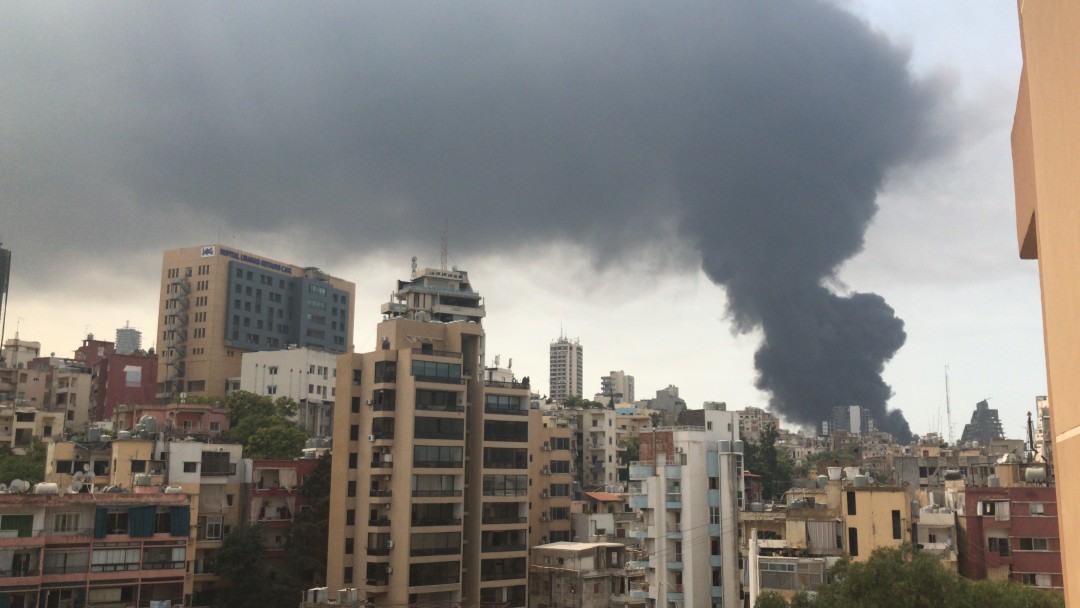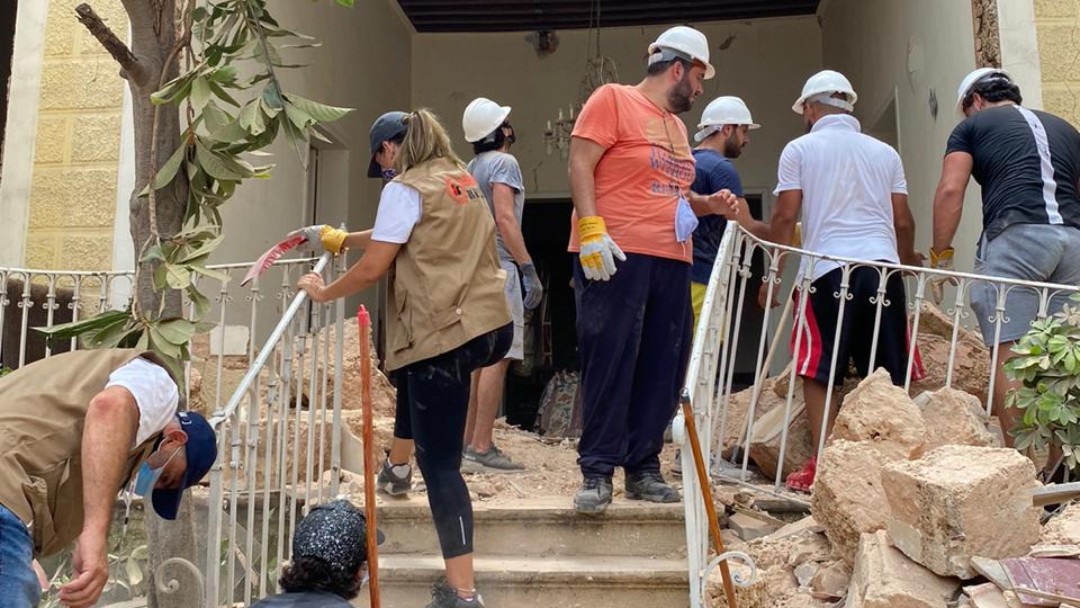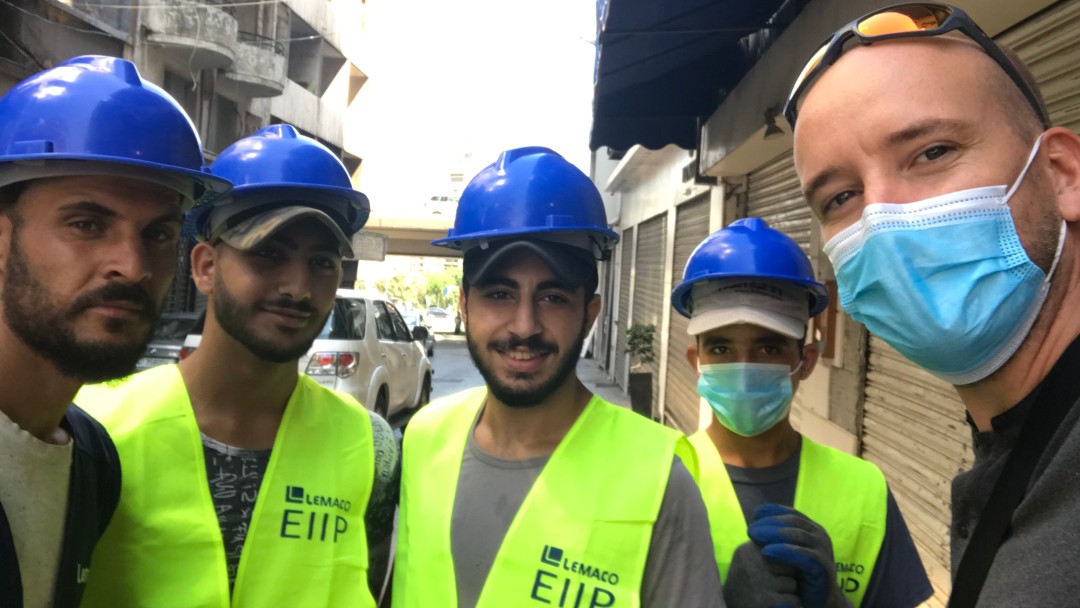News from 2020-09-17 / KfW Development Bank
Lebanon between explosion, pandemic and economic crisis

The fourth of August changed everything – all over again. Even before the devastating explosion in the port area of Beirut, the situation for people in Lebanon was not particularly easy, as the office director Sascha Stadtler explains. He has been living and working for KfW in the “Paris of the Middle East” for two years now and talks enthusiastically of the country and its people. “I have always wanted to spend an extended period living and working in Lebanon,” he explains over Skype while his coffee machine rattles away in the background. He was unable to rescue much else from his flat. Like the homes of his local colleagues, his flat is also no longer habitable for the time being. “Luckily, we all escaped uninjured and were able to spend the night of the accident with friends or relatives outside of the city.” Stadtler was in his flat when the 2,750 tonnes of ammonium sulphate exploded as a result of a fire in the port and he suddenly saw the glass front of his apartment racing towards him. Apocalyptic scenes played out on the streets and yet the true extent of the incident did not become clear until later: Around 300,000 homes in the centre of Beirut have been destroyed; entire neighbourhoods, like Gemmayzeh or Mar Mikhael, are basically uninhabitable. “People here are comparing the accident to the 15-year-long civil war and are unanimous in their belief that they had never experienced anything like this before.”
The explosion struck a debilitated country that had already been hit by a wide range of crises before this one.
For instance, the Lebanese population had only just started to believe that they were getting the coronavirus crisis under control. The first lockdown measures were imposed as early as March, which meant the number of new infections had fallen to zero by July. Now, five out of Beirut’s twelve hospitals have been completely destroyed and the rest were already working at the limits of their capacity even before the accident. Since the explosion, the virus has started spreading again in an almost uncontrollable manner; numbers are rising and new record highs are announced on a daily basis. People currently have other things to worry about than social distancing or protective masks. Emergency relief aid has since started to roll in from the international community, who immediately responded with aid commitments of EUR 250 million to date as well as comprehensive immediate aid, particularly in the medical sector.
However, the previous success in the fight against COVID-19 had its costs, the consequences of which have now been further exacerbated by the accident. With huge sovereign debt of over 160 per cent of gross domestic product already weighing down on the country before the crisis, a concoction of delayed reforms, corruption and persistently high deficits in the budget and current account resulted in an extensive economic and financial crisis, which set in at the very latest in the autumn of last year. The banks – once the pride of the country – went into a tailspin, dollars were scarce, and the government’s fiscal scope was becoming increasingly tight. Ever-larger sections of the previous middle class slipped into poverty, with the poverty rate having now soared to over 50 per cent. Wide-scale protests against the state system and the ruling elite had already mobilised large sections of the population as early as autumn of last year. To stem the spread of coronavirus, lockdown followed in the spring, which calmed the protests. However, the economy continued to weaken and pushed thousands of small businesses in particular towards bankruptcy. Since the explosion, the political instability is back – and is now stronger than ever.
However, it is also bringing the population back closer together again at the same time. Volunteers from across the country began the reconstruction work straight after the accident – at their own initiative, without any support from state or municipal authorities.

Acting on behalf of the German Federal Government, KfW has also stepped up its already wide-scale commitments in Lebanon – be it by expanding existing programmes or reallocating funds. In 2020, Lebanon became one of the Federal Ministry for Economic Cooperation and Development’s (BMZ) selected partner countries with whom it pursues long-term development goals. The aim of Germany’s support is to contribute to improved stability and conflict prevention, as well as economic development. At the moment, particular priority is being given to labour-intensive infrastructure measures, which – together with education projects – make up a large proportion of the portfolio of over half a billion euros. The goal is to quickly provide people with a livelihood again, while at the same time contributing to the recovery work. Here KfW is drawing on its positive experience from similar programmes, which it has been successfully implementing in poorer parts of the country for many years now and is now expanding to Beirut – with work having already begun in some cases. In Lebanon, FC is primarily implemented via UN organisations and international NGOs.
Following tensions and growing conflicts over the distribution of resources between poor Lebanese people and refugees from Syria in the past, the challenge here is to take both groups into account in equal measure. After all, as well as its own problems, the poor country and its population of approx. 4.5 million people has taken in over one million Syrian refugees since 2011, putting further strain on the already run-down infrastructure.
However, there is also some positive news here. According to the initial investigations, the city’s essential, basic infrastructure has sustained less damage than originally feared. The important water supply is already back up and running and basic healthcare is currently secured as well. The loss of the hospitals has been at least partially offset by the countless mobile health stations provided by the international community, though specialist medicines remain more or less impossible to obtain.

The destroyed port area has also been given a partial all-clear. The container terminal, which is so important for basic supplies, is not as damaged as feared. Since 85% of all of Lebanon’s food is imported and comes through Beirut’s port, there had been concerns over supply shortages.
However, Stadtler explains that the city still urgently needs experts in damage clearance and structural engineers. There is still a shortage of medical equipment, other immediate relief and a great deal of money. Money for rebuilding the destroyed city.

Share page
To share the content of this page with your network, click on one of the icons below.
Note on data protection: When you share content, your personal data is transferred to the selected network.
Data protection
Alternatively, you can also copy the short link: https://www.kfw-entwicklungsbank.de/s/enzBWrMC.CUQA
Copy link Link copied